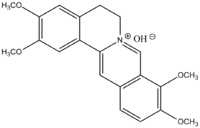Palmatine
 | |
| Names | |
|---|---|
| IUPAC name
2,3,9,10-tetramethoxy-5,6-dihydroisoquinolino[2,1-b]isoquinolin-7-ium | |
| Other names
Berbericinine | |
| Identifiers | |
| 3486-67-7 | |
| 3D model (Jmol) | Interactive image |
| ChEMBL | ChEMBL274189 |
| ChemSpider | 5224 |
| PubChem | 19009 |
| UNII | G50C034217 |
| |
| |
| Properties | |
| C21H22NO4+ | |
| Molar mass | 352.4083 g/mol |
| Density | 1.23 g/cm3 |
| Boiling point | 482.9 °C (901.2 °F; 756.0 K) at 760 mmHg |
| Except where otherwise noted, data are given for materials in their standard state (at 25 °C [77 °F], 100 kPa). | |
| Infobox references | |
Palmatine is a protoberberine alkaloid found in several plants including Phellodendron amurense, Rhizoma coptidis/Coptis Chinensis and Corydalis yanhusuo.[1]
It is the major component of the protoberberine extract from Enantia chlorantha.[2]
It has been studied for its potential use in the treatment of jaundice, dysentery, hypertension, inflammation, and liver-related diseases.[3] This compound also has weak in vitro activity against flavivirus.[4]
See also
References
- ↑ Wang YM, Zhao LB, Lin SL, Dong SS, An DK (1989). "[Determination of berberine and palmatine in cortex phellodendron and Chinese patent medicines by HPLC]". Yao Xue Xue Bao = Acta Pharmaceutica Sinica (in Chinese). 24 (4): 275–9. PMID 2816389.
- ↑ Virtanen P., Njimi T.,Ekotto Mengata D.:Clinical trials of hepatitis cure with protoberberine alkaloids of Enantia Chlorantha (abstract) Eur.J.Clin.Pharmacol.36: A123, 1989b
- ↑ Bhadra K, Kumar GS (January 2010). "Therapeutic potential of nucleic acid-binding isoquinoline alkaloids: Binding aspects and implications for drug design". Medicinal Research Reviews: n/a. doi:10.1002/med.20202. PMID 20077560.
- ↑ Jia F., Zou G., Fan J., Yuan Z."Identification of palmatine as an inhibitor of West Nile virus" Archives of Virology 2010 155:8 (1325-1329)
This article is issued from Wikipedia - version of the 6/4/2016. The text is available under the Creative Commons Attribution/Share Alike but additional terms may apply for the media files.